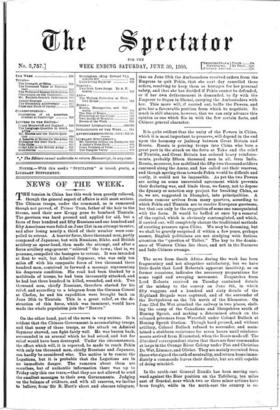It is quite evident that the unity of the Powers
in China, which it is most important to preserve, will depend in the end upon the harmony or jealousy between Great Britain and Russia. Russia is pouring troops into China who bore a great part in the attack on the forts at Taku and the relief of Tientsin, and Great Britain has ordered heavy reinforce- ments, probably fifteen thousand men in all, from India. Russia, moreover, has mobilised the fifty-two thousand soldiers cantoned along the Amur, and has called out their reserves, and though moving them towards Pekin wonld be difficult and costly, it would not be impossible. As yet the two Powers are acting on some unrevealed agreement which prevents their declaring war, and binds them, we fancy, not to depose the dynasty or sanction any project for breaking China, as is, we see, suggested in Shanghai, into principalities. A curious rumour arrives from many quarters, according to which Pekin and Tientsin are to receive European garrisons, but that can only be the suggestion of some one unacquainted with the facts. It would be baffled at once by a removal of the capital, which is obviously contemplated, and which, if carried out, will completely change the traditional methods of exerting pressure upon China. We may be dreaming, but we shall be gravely surprised if within a few years, perhaps sooner, English politicians are not studying with furious attention the "question of Thibet." The key to the domin- ance of Western China lies there, and not in the Burmese and Indo.Chinese swamps.


















































 Previous page
Previous page